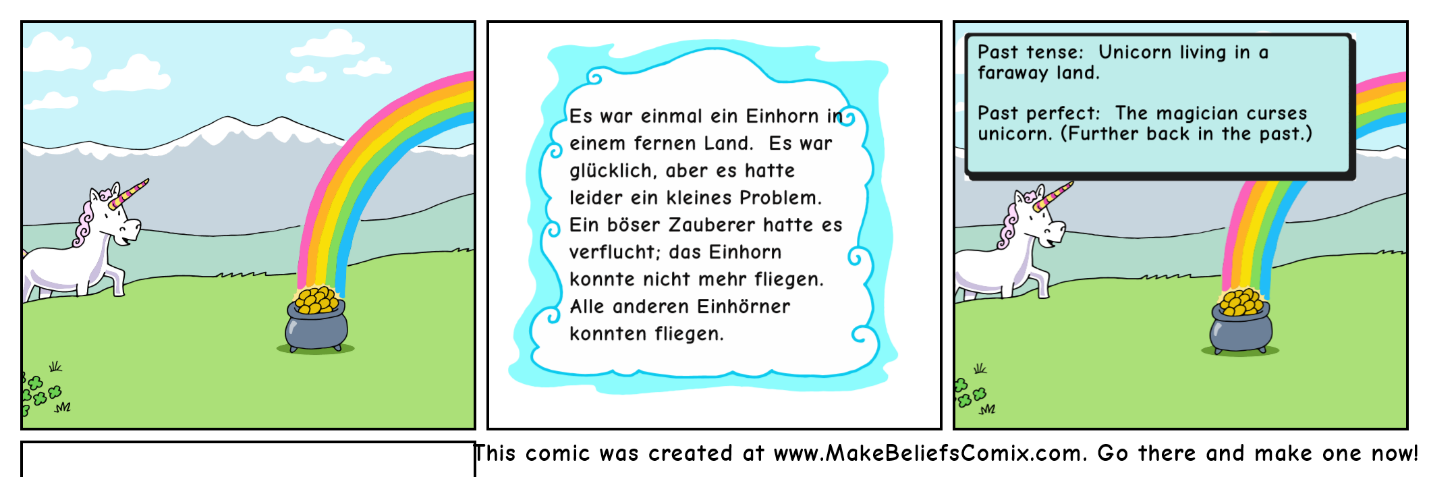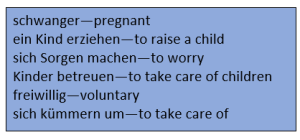5 Kapitel 7-5: Plusquamperfekt
7-5: Das Plusquamperfekt (Past Perfekt)
In Chapter 5, you learned conversational past, also called das Perfekt.
Mein Vater hat viele Jahre bei einer Bank gearbeitet.
(My father worked/has worked/was working for many years at a bank.)
Wir sind vor drei Monaten nach Europa gereist.
(We traveled/have traveled/were traveling to Europe 3 months ago.)
→Go here to review the conversational past: https://una.pressbooks.pub/german-102/chapter/section-5-2/
There is another tense that is similar to conversational past called Plusquamperfekt, or past perfect. Compare the sentences below to das Perfekt (conversational past.) What differences do you notice?

The conversational past and past perfect are different ONLY in the helping verb. You will use the simple past form of the helping verb in Plusquamperfekt.
“So…what’s the difference?” you may be wondering.
The Plusquamperfekt takes place at a point in time before the action in conversational past does. In English, we would translate it like this:
- Letzten Sommer haben wir unsere Großeltern in München besucht. Wir hatten sie schon vor fünf Jahren besucht.
- (Last summer we visited my grandparents in München. We had already visited them five years ago.)
 This “had” shows us that the action took place at a separate time before the story of our current visit.
This “had” shows us that the action took place at a separate time before the story of our current visit.
Frage: But how will I know when to use conversational past or the past perfect?
Antwort: Use your knowledge of English to help you. If you would normally say something like, “I had eaten” or “I had gone,” then you will use the past perfect. It pretty much matches up one-to-one on usage in both English and German.
Plusquamperfekt is often used in English to explain back story when narrating events. It works the same way in German. Suppose you’re telling about going to the movies last weekend. Then, in the middle of your story, you remember something that happened even further back that relates to your story.
- Am Wochenende sind wir ins Kino gegangen. Wir haben den neuen James Bond Film gesehen. Meine Schwester hatte ihn schon vor zwei Wochen geguckt, aber ich habe ihn erst am Wochenende gesehen. Er war okay aber nichts besonderes.
- On the weekend, we went to the movies. We saw the new James Bond movie. My sister had already watched it, but I saw it first on the weekend. It was okay but nothing special.
During this narration, we throw in something that happened at an earlier time period. To show that, we put it in the past perfect, aka Plusquamperfekt.

Watch this video by DIE Lateinlehrerin which reteaches this:
Ex. A: Nachdem ich… Using the subordinating conjunction nachdem and the Plusquamperfekt, tell the order in which you did the following things.
Beispiel: das Bett machen; zur Arbeit gehen
→Nachdem ich das Bett gemacht hatte, bin ich zur Arbeit gegangen.
- Karaoke singen; in den Musikunterricht gehen
- ein neues Auto kaufen; das alte Auto verkaufen
- mit dem Professor sprechen; in den Supermarkt gehen
- nach Deutschland reisen; nach Europa fliegen
- gestern regnen; eine Hitzewelle haben
- den Arzt anrufen; Medikamente nehmen
Ex. B: Der Sommer. Beschreiben Sie Ihre Sommerferien. Was haben Sie gemacht? Haben Sie schon vorher diese Aktivitäten gemacht, oder war alles neu? Verwenden Sie dabei haben und sein im Präteritum, sowie das Perfekt und das Plusquamperfekt.
Beispiel: Letzten Sommer bin ich nach Deutschland gereist. Ich hatte schon vor drei Jahren eine Reise nach Deutschland gemacht, aber diesmal war alles viel spannender! Wir hatten 21 Studenten in unserer Gruppe. Wir haben viele leckere Spezialitäten gegessen…usw.
EXTRA PRACTICE: Go to Germanzone.org’s site to do extra practice on the past perfect. The first exercise practices whether to use haben or sein as the helping verb. The second one has you putting the sentence into the past perfect.
- https://www.germanzone.org/past-perfect-tense-auxiliary-verbs-1/
- https://www.germanzone.org/past-perfect-tense-auxiliary-verbs-2/
Ex. C: Nicos Weg. Episode 15: Kinder. Gucken Sie die Episode und beantworten Sie die Online-Fragen. You will review the modal verb dürfen, which you learned in Chapter 3.
https://learngerman.dw.com/en/kinder/l-38185831


